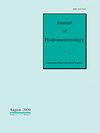Oceanic Validation of IMERG-GMI Version 6 Precipitation using the GPM Validation Network
IF 2.9
3区 地球科学
Q2 METEOROLOGY & ATMOSPHERIC SCIENCES
引用次数: 0
Abstract
NASA’s multi-satellite precipitation product from the Global Precipitation Measurement (GPM) mission, the Integrated Multi-satellitE Retrievals for GPM (IMERG) product, is validated over tropical and high-latitude oceans from June 2014 to August 2021. This oceanic study uses the GPM Validation Network’s island-based radars to assess IMERG when the GPM Core Observatory’s Microwave Imager (GMI) observes precipitation at these sites (i.e., IMERG-GMI). Error tracing from the Level 3 (gridded) IMERG V06B product back through to the input Level 2 (satellite footprint) Goddard Profiling Algorithm GMI V05 climate (GPROF-CLIM) product quantifies the errors separately associated with each step in the gridding and calibration of the estimates from GPROF-CLIM to IMERG-GMI. Mean relative bias results indicate that IMERG-GMI V06B overestimates Alaskan high-latitude oceanic precipitation by +147% and tropical oceanic precipitation by +12% with respect to surface radars. GPROF-CLIM V05 overestimates Alaskan oceanic precipitation by +15%, showing that the IMERG algorithm’s calibration adjustments to the input GPROF-CLIM precipitation estimates increase the mean relative bias in this region. In contrast, IMERG adjustments are minimal over tropical waters with GPROF-CLIM overestimating oceanic precipitation by +14%. This study discovered that the IMERG V06B gridding process incorrectly geolocated GPROF-CLIM V05 precipitation estimates by 0.1° eastward in the latitude band 75°N–S, which has been rectified in the IMERG V07 algorithm. Correcting for the geolocation error in IMERG-GMI V06B improved oceanic statistics, with improvements greater in tropical waters than Alaskan waters. This error tracing approach enables a high-precision diagnosis of how different IMERG algorithm steps contribute to and mitigate errors, demonstrating the importance of collaboration between evaluation studies and algorithm developers.利用 GPM 验证网络对 IMERG-GMI 第 6 版降水进行海洋验证
美国国家航空航天局全球降水测量(GPM)任务的多卫星降水产品--全球降水测量多卫星综合检索(IMERG)产品,于2014年6月至2021年8月在热带和高纬度海洋上空进行验证。这项海洋研究利用 GPM 验证网络的岛基雷达,在 GPM 核心观测站的微波成像仪(GMI)在这些站点观测降水时评估 IMERG(即 IMERG-GMI)。从第 3 级(网格化)IMERG V06B 产品到输入第 2 级(卫星足迹)戈达德剖面算法 GMI V05 气候(GPROF-CLIM)产品的误差追踪,分别量化了从 GPROF-CLIM 到 IMERG-GMI 的网格化和校准估算中每一步的相关误差。平均相对偏差结果表明,与地面雷达相比,IMERG-GMI V06B 高估了阿拉斯加高纬度海洋降水量+147%,高估了热带海洋降水量+12%。GPROF-CLIM V05 高估了阿拉斯加海洋降水量+15%,表明 IMERG 算法对输入的 GPROF-CLIM 降水量估计值的校准调整增加了该地区的平均相对偏差。相比之下,IMERG 在热带水域的调整很小,GPROF-CLIM 高估了 +14% 的海洋降水量。这项研究发现,IMERG V06B 的网格划分过程错误地将 GPROF-CLIM V05 降水量估算值在 75°N-S 纬度带向东偏移了 0.1°,IMERG V07 算法已经纠正了这一错误。IMERG-GMI V06B 中的地理定位误差修正改善了海洋统计,热带水域的改善程度大于阿拉斯加水域。这种误差跟踪方法能够对 IMERG 算法的不同步骤如何导致和减少误差进行高精度诊断,显示了评估研究与算法开发人员之间合作的重要性。
本文章由计算机程序翻译,如有差异,请以英文原文为准。
求助全文
约1分钟内获得全文
求助全文
来源期刊

Journal of Hydrometeorology
地学-气象与大气科学
CiteScore
7.40
自引率
5.30%
发文量
116
审稿时长
4-8 weeks
期刊介绍:
The Journal of Hydrometeorology (JHM) (ISSN: 1525-755X; eISSN: 1525-7541) publishes research on modeling, observing, and forecasting processes related to fluxes and storage of water and energy, including interactions with the boundary layer and lower atmosphere, and processes related to precipitation, radiation, and other meteorological inputs.
 求助内容:
求助内容: 应助结果提醒方式:
应助结果提醒方式:


